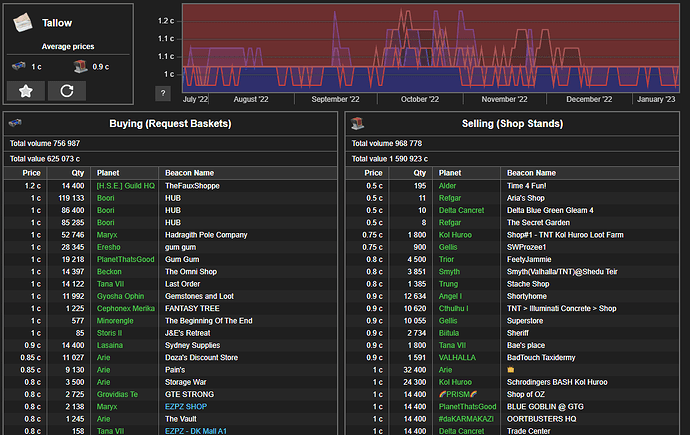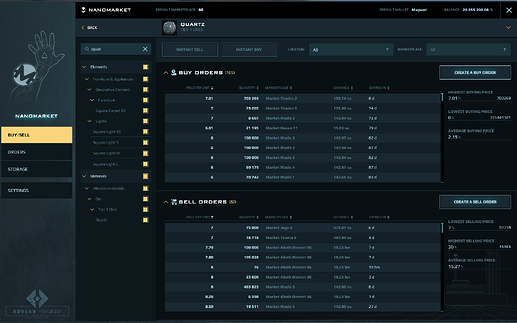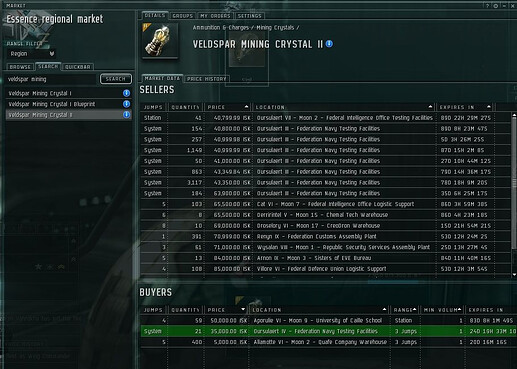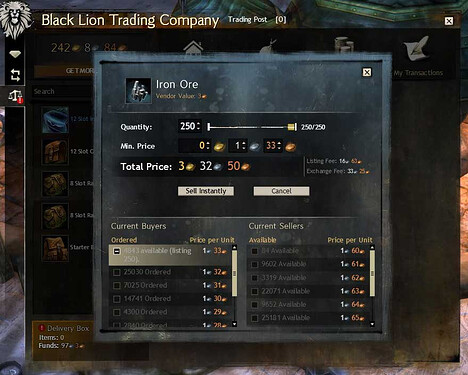OK so I made a sort of off-topic comment today in another thread about requests baskets, and something I call “economic confusion”. I actually searched a couple of months ago for any old posts I had made on this topic, but it seems it’s something I’ve discussed primarily in discord chats in the past.
Just to be clear this isn’t a thread advocating for change or necessarily arguing against request baskets. It’s just a discussion of the obstacles they present to the formation of familiar economic models, and some of the attendant difficulties for people trying to start up shops, or wondering why shops and “the economy” are so weird in Boundless.
I’m not aware of any straight analog to request baskets. Especially not paired with player shops.
Definitely not IRL and nothing really quite like it in any other virtual economy I’ve participated in. These cloud the “market pricing” model that many people depend on to market their products and goods, and also remove, for many players, the necessity to seek out the things they need. I’m aware that many players lean on this convenience so again, I’m not saying good vs. bad, just that i’s different.
In real life and most virtual economies we have a much more unidirectional economy. If you have something to sell you bring it to the appropriate market, or you find buyers/consumers for your products and make distribution arrangements. For some (even most in gaming economies) items this may include an auction house model which does offer buy and sell orders.
However even there lowball offers or “donation requests” are usually discouraged with fee structures, and a level of centralization that isn’t really present (natively) in Boundless. Also most of these types of orders are time-limited and thus require an active buyer to have at least “one eye on” the actual economy, or continuously waste money on fees.
You can’t, for instance, in real life get one cow, milk it in the morning, and then wander around town looking for baskets on people’s porches with money in them and a note asking for milk. Nor would you, if you needed a hammer or some wood to build a shed, just put out a note and hope that these things materialized on your porch at whatever random price you decided you wanted to pay.
Instead you look for a seller, perhaps considering several, and determine which one meets your needs at or near your budget. Same, in most cases, with an “auction house economy”.
It’s a common complaint that people go to the length to build a shop, and then they have a hard time selling anything. This is a slightly different issue with crafted items than with raw materials, but it’s still applicable to both, as request baskets can and do exist for all items in game. This is more of an issue, however, with raw materials.
This issue exists in large part because real active buyers quickly become known for their request baskets and they have no need to patronize player shops or participate in a more familiar sales-focused market pricing models.
Even with tools like BUTT or Boundlexx a player trying to sell something they don’t frequently trade in has no way to be aware of what prices commerce is happening at - there’s no way to tell if “the good baskets” are just empty right now, or if they exist at all. And since players can (and do) just leave out baskets with lowball offers in them, the spread on existing aggregators is more indicative of prices at which commerce is not happening.
If you’re entering a market and you want to be competitive, do you compete with the baskets, or the stands? Trial and error is the only way and that comes at a cost, whether that’s paid on confusion or coins.
IMO the model has both strong pros and cons. However without strong centralization like a universe-wide auction house where you can fully inspect and compare all items and offers - either a selling oriented or a buying oriented (unidirectional) economy would in fact be more intuitive to the people involved, and create, overall, a stronger economy.
So anyways that should be enough to solicit some thoughts, even if it’s a little vague. I’m distracted and don’t want to start with a novel length post. I am somewhat interested in peoples’ thoughts on this and it’s led to a couple of interesting discussions in the past. Again this isn’t really an attempt to advocate for or against - just a look at how this is different from other models and what effects it has.


 wait… where are the doors? why they are closed? wait. i see portal inside… i want to go inside let me in !!! looking closer thru doors, no label above portal, ok trying to force sanctum portal to bump me inside… no luck, screw it, going to check another seller from list
wait… where are the doors? why they are closed? wait. i see portal inside… i want to go inside let me in !!! looking closer thru doors, no label above portal, ok trying to force sanctum portal to bump me inside… no luck, screw it, going to check another seller from list


